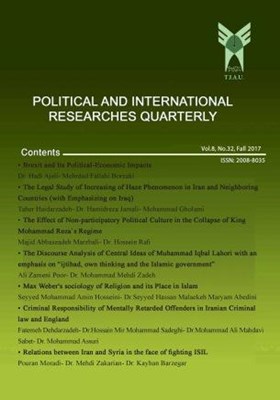The Effect of Non-participatory Political Culture in the Collapse of King Mohammad –Reza`s Regime
Subject Areas : Political and International Researches Quarterly
Keywords: Non-Participatory Political Culture, Despotic Governmental Structure, Crisis of legitimacy, Collapse, the Second Pahlavi Era,
Abstract :
Majid Abbaszadeh Marzbali- Hossein Rafi’, Ph. D The present paper aims to survey the impact of non-participatory political culture on the collapse of Shah`s regime. Although political culture in the second Pahlavi`s reign was influenced by a verity of factors, the paper maintains, the historical facts would considerably point to the impact of despotic governmental structure as the most fundamental ones. In general, as a despotic rule, king Mohammad-Reza`s reign acted as an obstacle to the public participation in politics and, hence, led people to political passiveness and apathy. Such a situation, on the whole, inhibited the genesis of a participatory political culture in Iran, and on the contrary, played part in the rise of a non-participatory (passive) one. As a matter of fact, in order to consolidate its foundation, the government was always promoting such a political culture which caused the prevalence of some negative features in Iranian society, such as public fear of the king (government), feeling of insecurity, political apathy, violence and antagonism, law-braking, cajole and wheedle, intolerance, etc.
_||_

